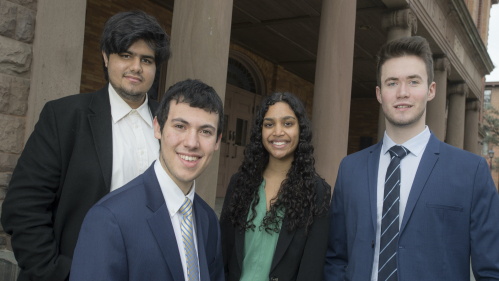Rutgers’ IDEA Helps Student Entrepreneurs to Empower Pregnant Women

New mobile app BabySafe Health is designed to reduce mortality rates in Black infants
Looking to better society but unsure how, four freshmen came together last year at Rutgers-New Brunswick’s Innovation, Design, and Entrepreneurship Academy (IDEA), where they discussed why Black infants die at a higher rate than white infants in the United States.
Since then, they have developed BabySafe Health, a free mobile app designed to reduce racial health disparities and give all babies an equal opportunity to be healthy. The app has a variety of features to provide mothers with a personalized solution that includes a machine-learning algorithm to analyze past infant mortality data and give women insight into their pregnancy. The app can help any expecting mother but is primarily targeted toward women of color.
“Our goal is to provide a systematic, personalized solution that empowers mothers, so they can be fully aware of their own healthcare needs and prevent adverse health effects,” said Scott Rubin, a sophomore from Highland Park, N.J., at the Rutgers Business School and one of the company’s four co-founders.
His colleagues are Fauzan Amjad, a sophomore from Woodbridge, N.J., at the School of Arts and Sciences who is majoring in computer science on a pre-medicine track; Max Handler, a sophomore from Verona, N.J., at SAS who is majoring in computer science and minoring in data science; and Sanjana Sure, a sophomore from Parsippany, N.J., at RBS who is a double major in finance and Business Analytics and Information Technology with a minor in real estate.
In the United States, black infants die at more than twice the rate – and in New Jersey more than three times the rate – as white infants.
“This is largely due to social determinants such as accessibility, socioeconomic status, language barriers and education,” Amjad said. “New Jersey, and the rest of the world, need a solution that puts information and accessibility directly into the hands of mothers.”
The BabySafe Health app provides pregnant women with an all-in-one platform that connects them with a symptom tracker, doctor’s office finder and a proprietary machine-learning algorithm that uses information from the mother and provides data-driven insights on potential health consequences throughout their pregnancy.
Sure said, “Our app will give economically and socially disadvantaged women the knowledge that they need to feel empowered and in control during their pregnancy.”
Last fall, the BabySafe Health team won first place in the Johnson & Johnson and Amazon Web Services Black Tech Health Hackathon, where they showed how an algorithm could detect infant mortality in mothers with 91% accuracy using several health factors and medical histories as predictors.
The BabySafe Health team also participated in the Innovation Corps (I-Corps) Northeast Hub, a nationwide network of university hubs funded by the National Science Foundation to help researchers get their inventions to market quickly. The team used customer insights and a new business model gained from that experience to create a larger social media presence and apply for grants and pitch competitions.
The BabySafe Health team also won $25,000 in the TechUnited BetterWellness Challenge after pitching their app to corporate executives from LabCorp, RWJBarnabas Health and Colgate-Palmolive at the Propelify Innovation Festival, which is designed to help entrepreneurs get their products to market. The team also won RISE 2021 hosted by the Rutgers Entrepreneurial Society as well as being semi-finalists in the 2021 Amazon Web Services U.S. University Startup Competition.
The BabySafe Health team members are currently innovation fellows at the Rutgers Innovation Lab, part of the Rutgers-New Brunswick Honors College, and are beginning to look for beta testers.
“Our app is built to be an all-in-one guide for expecting mothers, so social determinants will have less of an impact on pregnancies and we can minimize the disparity in pregnancy outcomes,” Handler said. “Overall, our application will have a positive impact by providing mothers more autonomy and the appropriate resources to obtain the care they need.”
IDEA Associate Director Veronica Armour said the academy provides hands-on and experiential learning opportunities that encourage students to discover their interests and strengths and, ultimately, pursue a career path after graduation.
“The BabySafe Health app highlights how Rutgers’ Innovation ecosystem is growing and how a team of first-year students took advantage of what we have to offer and excelled,” she said. “Now, they have plenty of time to leverage Rutgers and its partnerships to grow their idea.”
The BabySafe Health team plans to beta test its app at Rutgers Robert Wood Johnson Medical School and Rutgers New Jersey Medical School.
“Without IDEA and the entire Rutgers ecosystem, we would not be where we are today and all four of us owe a lot of gratitude to what has been accomplished to them,” said Scott, who is also president of the IDEA Student Leadership Board.
Click here for more information about Innovation, Design, and Entrepreneurship Academy (IDEA).


